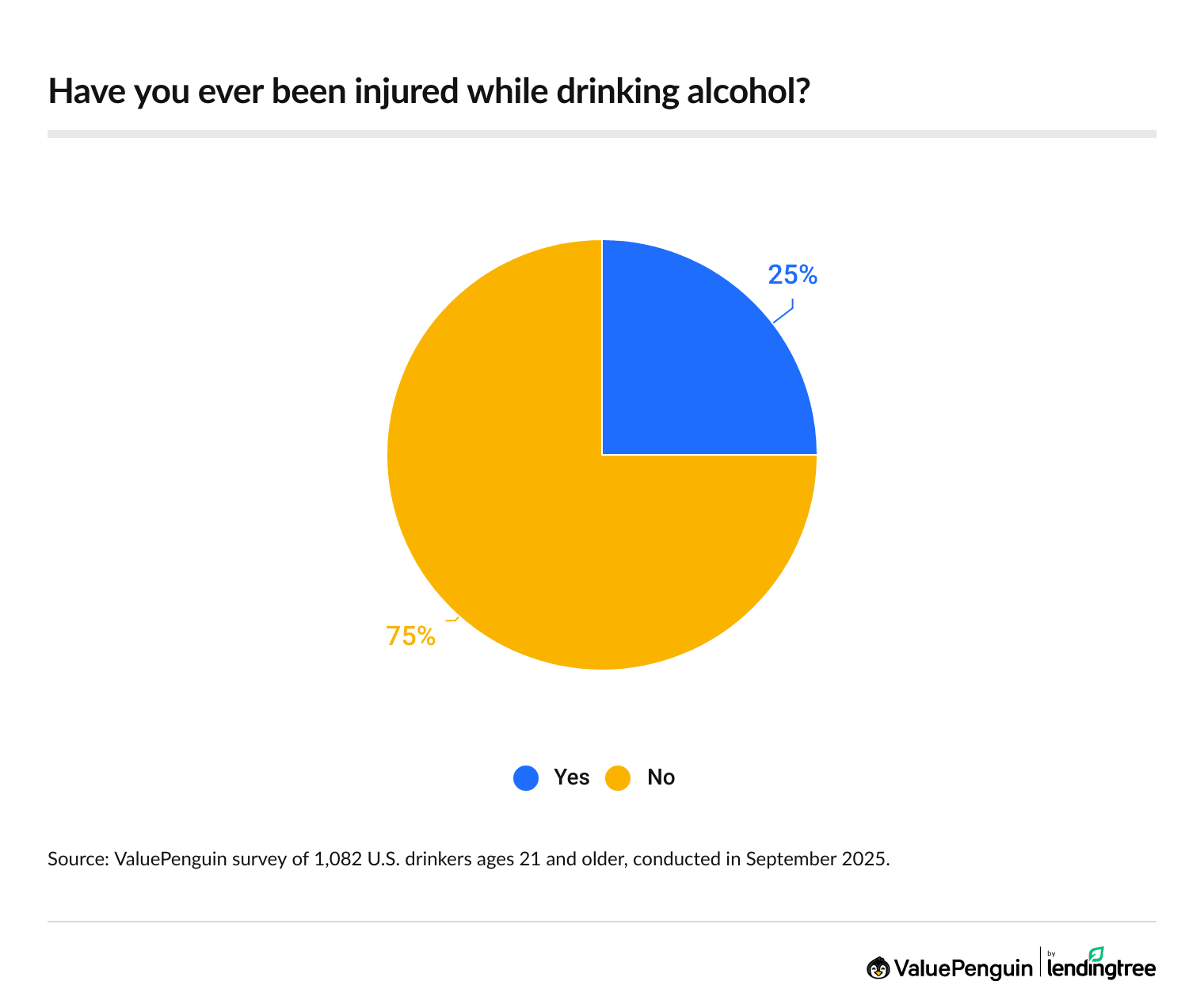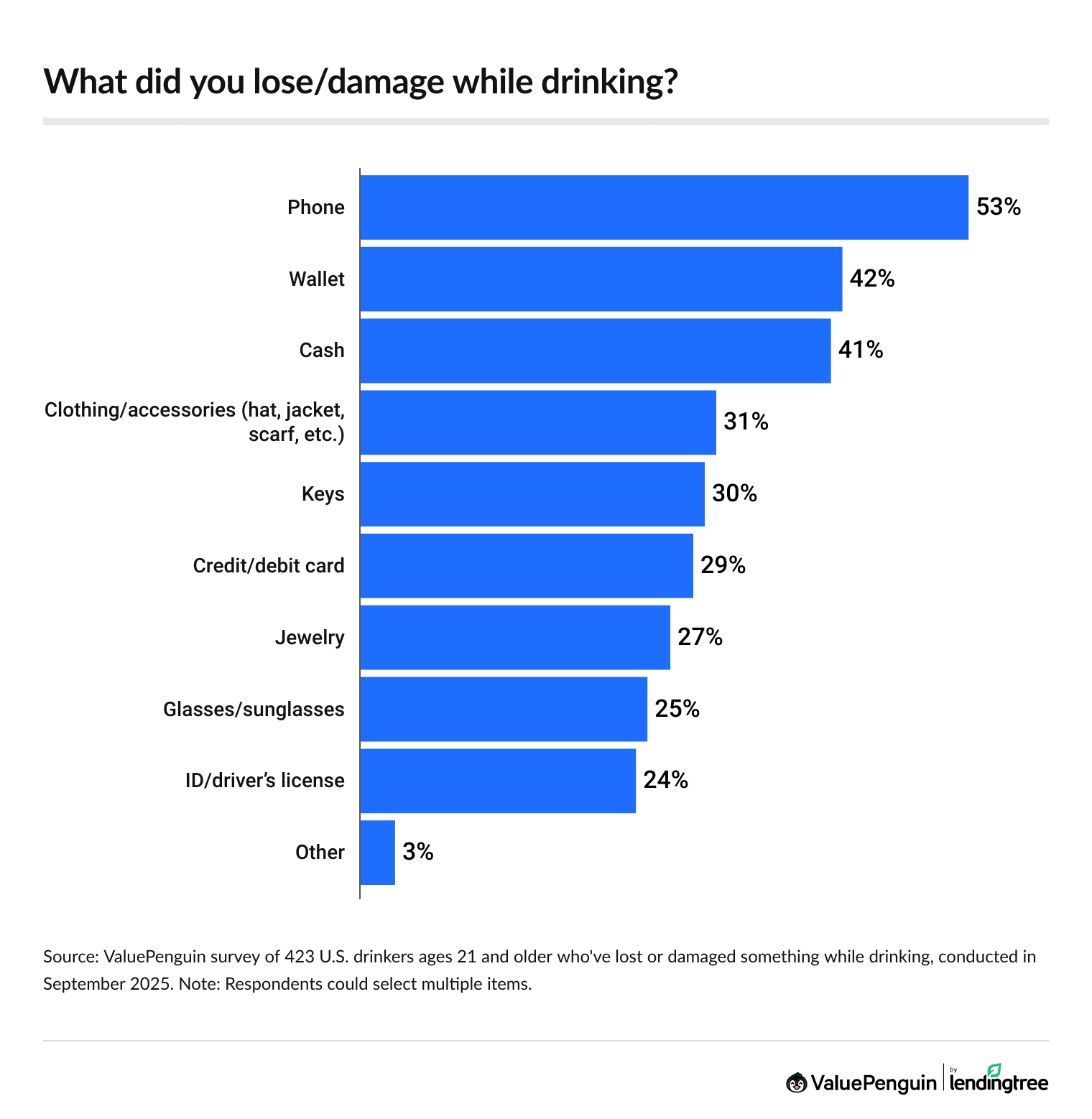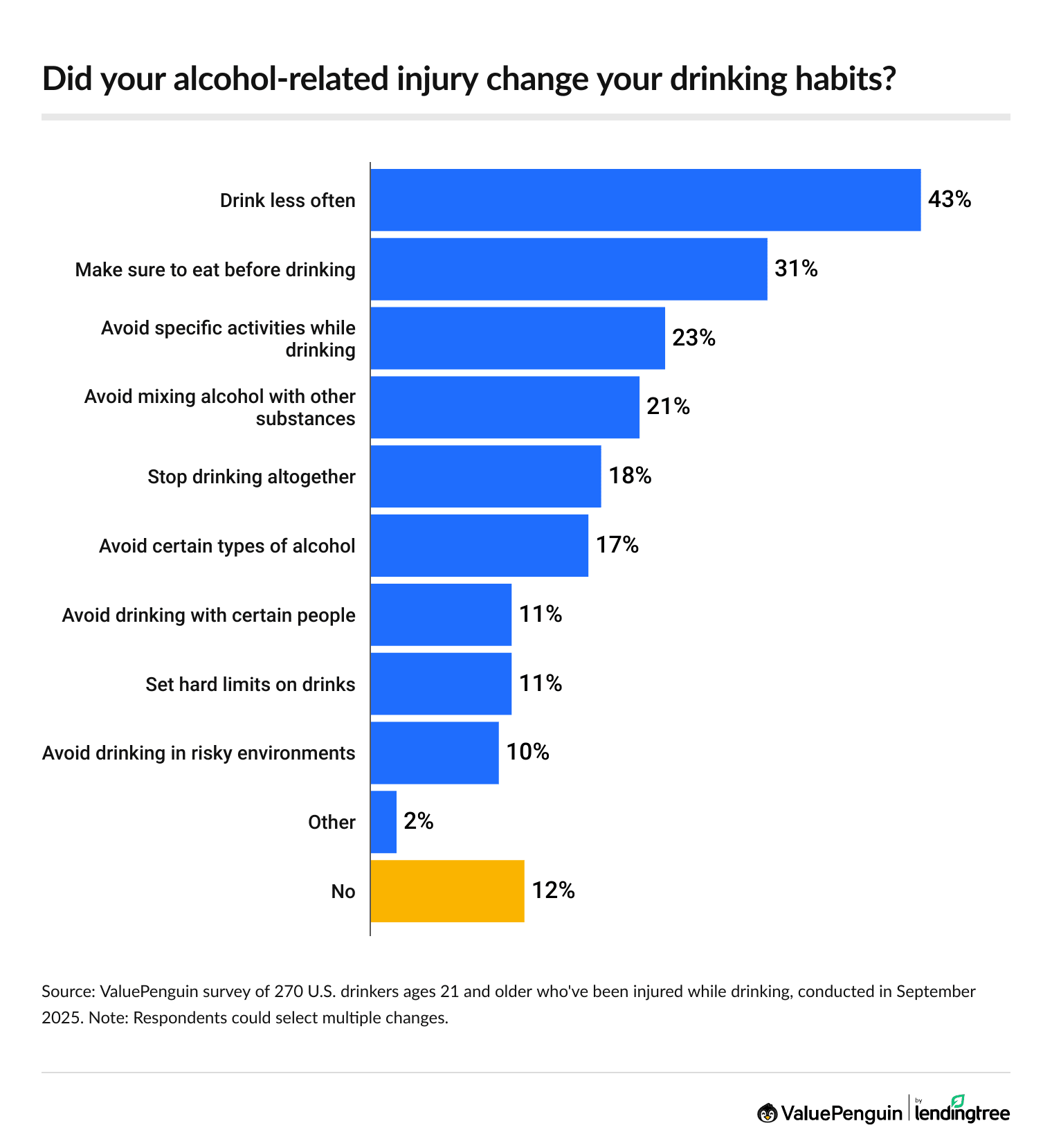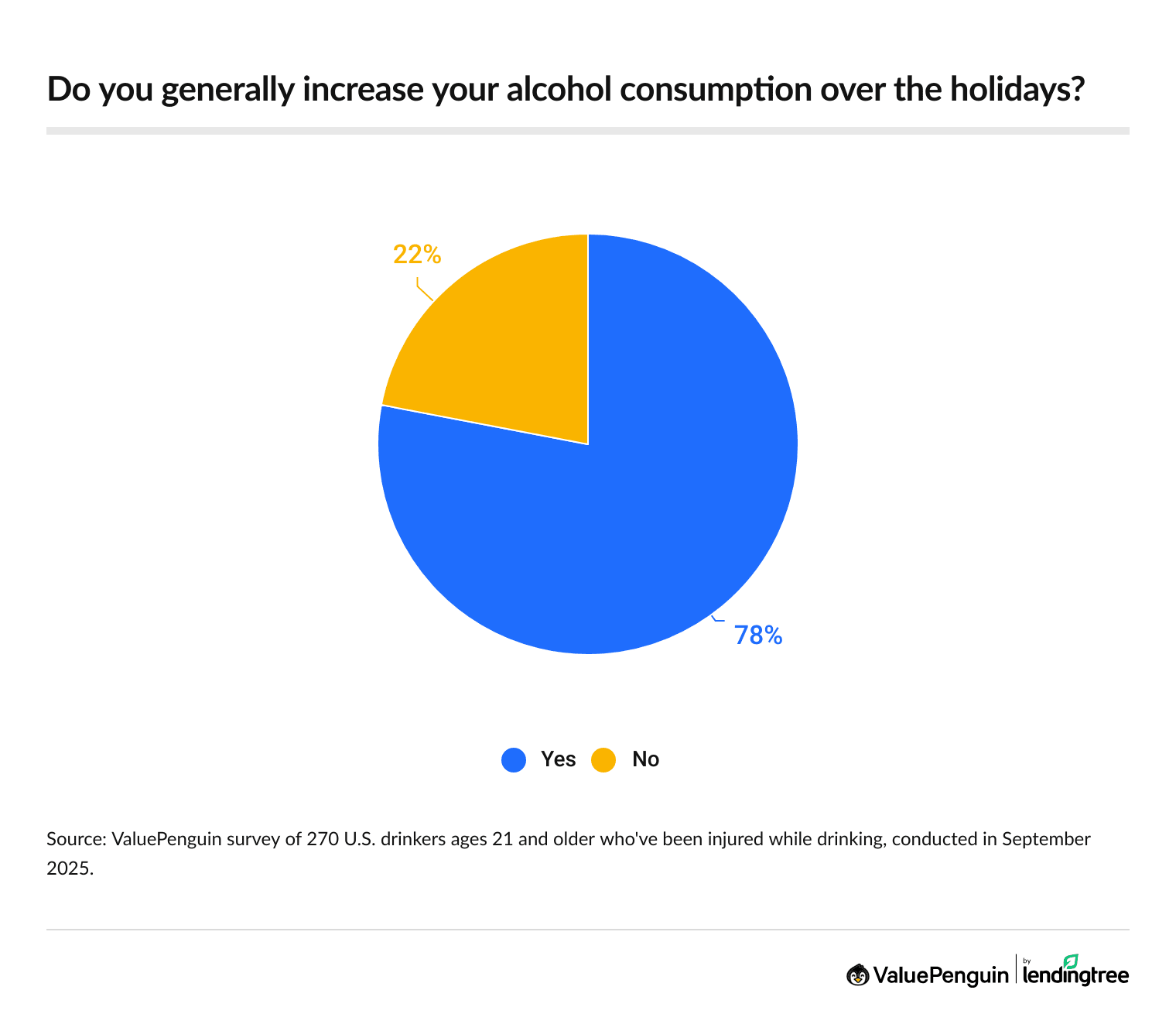Health Insurance
1 in 4 Drinkers Have Been Hurt While Buzzed, With Many Requiring Medical Care

A few drinks can turn any room into an obstacle course. According to a ValuePenguin survey of nearly 1,950 Americans, 25% of drinkers 21 and older say they’ve been injured under the influence — and 68% of them needed medical attention.
Here’s a closer look at the reported consequences of drunken injuries, how drinkers changed their habits and more. Additionally, we’ll dive into how your health insurance treats injuries that occurred under the influence.
On this page
Key findings
- Drinking doesn’t just lead to hangovers. 1 in 4 (25%) drinkers 21 and older say they’ve been injured under the influence. 68% of them needed medical attention, with 60% spending $1,000 or more the last time they received care. Additionally, 69% of injured drinkers have had to miss work, school or other responsibilities as a result.
- Some have lost property while under the influence. 39% of drinkers have lost or damaged a valuable personal item while drinking — most commonly phones (53%), wallets (42%) and cash (41%). While Gen Zers drink less overall, 50% of current or past Gen Z drinkers reported losing a valuable personal item while imbibing.
- Injuries may spark habit changes for some. Of those who’ve experienced an alcohol-related injury, 88% say they changed their habits after. Most commonly, they’re cutting back (43%), eating before (31%) or avoiding certain activities while drinking (23%).
- Drinking surges around the holidays. 61% of drinkers with an injury say it’s happened at least once during the holidays. However, 78% of them generally increase their alcohol consumption over the holidays.
Booze and bruises go hand in hand
"Hold my beer" may be less of a punchline and more of a common experience. In fact, a whopping 25% of drinkers 21 and older say they’ve been injured under the influence.

Of this group, 68% needed medical attention. Those injuries can be particularly costly, with 40% spending $999 or less and 60% spending $1,000 or more the last time they received care.
The consequences may be more than just financial, as 69% of injured drinkers have had to miss work, school or other responsibilities as a result.
Men are more likely to experience injuries than women. Of those who are current or past drinkers, 31% say they were injured after drinking, with 71% requiring medical attention. That compares with 17% of women reporting injuries, of whom 56% required medical attention.
The most common causes of injuries were slips and falls (27%), while more serious cases included being in a fight (7%), crashing a vehicle (7%) and getting alcohol poisoning or overdosing (6%). Most injuries happened at home (32%), followed by bars or restaurants (16%) and outdoor settings (13%). Another 7% reported getting hurt while traveling in a car or on a train, bus or rideshare.
According to ValuePenguin health insurance expert Talon Abernathy, your health insurance may not always cover a drinking injury.
"In most of the country, alcohol-related injuries are treated no differently than normal accidents," he says. "However, 18 states have what are called alcohol exclusion laws (AELs) that let health insurance companies deny claims if you get injured while intoxicated. Keep in mind, the injury doesn't have to be caused by drinking. If you have a few beers and trip over a poorly placed electrical cord, you could still get your claim denied in these states."
In the other states that don't have AELs, Abernathy warns that you still have to pay the full cost of treatment until you meet your deductible if you get injured while under the influence.
"That means your health insurance might not come into play if your hospital bill comes to $1,000 and you have a $5,000 deductible, assuming you've used $4,000 or less of health care services so far this year," he says. "If you've already met your deductible for the year or this injury pushes you over the edge, you'll either pay a fixed fee (called a copay) or a percentage of your medical bill after subtracting your deductible (called coinsurance)."
How often do Americans drink?
Overall, 56% of Americans report drinking alcohol, with 49% of drinkers saying they drink weekly.
Six-figure earners (68%), those earning $50,000 to $99,999 (67%) and parents with children younger than 18 (66%) are the most likely to drink. Meanwhile, millennials ages 29 to 44 (62%) are the most likely age group.
Also of note, 64% of men say they drink, and 23% of male drinkers admit they do so daily. Conversely, 52% of women say they’re nondrinkers or former drinkers. That compares with 44% across all demographics.
39% of drinkers have lost something while under the influence
Injuries may heal, but losing something means it could be gone forever. Among drinkers, 39% have lost or damaged a personal item while under the influence. Phones (53%), wallets (42%) and cash (41%) are the most commonly lost items.

That figure rises to 58% among those with children younger than 18 — the highest by demographic. Millennials (55%) and six-figure earners (53%) follow.
88% of injured drinkers have changed their habits after
For many drinkers, an injury may simply be a catalyst for change. Of those who’ve experienced an alcohol-related injury, a significant 88% say they changed their habits after.
About 43% say they’re cutting back — the most common response. Eating before a night out (31%) or avoiding certain activities while drinking (23%) are the next most common responses.

By demographic, 92% of those with children younger than 18 report changes after a drunk injury, with 44% cutting back and 21% stopping drinking altogether.
Abernathy says you may be able to tap into your insurance to promote cutting back.
"Many health insurance plans offer wellness programs that may include counseling," he says. "These are often geared toward general health outcomes, which means alcohol-related assistance would only constitute a portion of the overall program."
What's important to keep in mind, however, is that all regular health insurance plans have to pay for substance-use disorder treatment under the Affordable Care Act (ACA). That means you'll typically have coverage for screenings, counseling, medications and rehabilitation, although the specifics may vary depending on where you live and your plan details.
"It's also important to note that mental health services are another required coverage area under the ACA," he says. "Because many people who have substance-use disorders also suffer from mental illnesses, individuals looking to make behavioral changes may find it useful to seek out a psychiatrist, psychologist or other trained professional in this area."
Drinking rises during the holidays
Perhaps unsurprisingly, 61% of drinkers with an injury say it’s happened at least once during the holidays. However, 78% of drinkers who’ve been injured say they generally increase their alcohol consumption over the holidays.

Regardless of the time of year or how you get injured, Abernathy says you'll still have all the protections offered by your health insurance plan.
"Despite the increased number of health insurance claims arising from alcohol-related injuries during the holidays, companies haven't taken action to protect enrollees during the holiday season specifically," he says. "However, you can take advantage of year-round alcohol treatment and prevention services required of all health insurance plans nationwide by the ACA."
It's essential to remember that health insurance companies can't deny coverage or raise your rates due to a preexisting condition. That means even though December is in the middle of open enrollment, visiting the hospital or making an alcohol-related claim won't impair your ability to switch plans.
Reducing alcohol-related health risks: Top expert tips
If you’re concerned about your drinking habits during the upcoming holiday season and are prone to injury, there are a few things to keep in mind this year:
- Research the laws in your area. "If you live in one of the 18 states that still let health insurance companies deny coverage based on intoxication, it's vital you limit your drinking during the holiday season to avoid a hefty medical bill," Abernathy says. "Even if you don't live in one of these areas, it's still a good idea to avoid getting intoxicated for both your short- and long-term health. Try setting a hard limit of one to three drinks during gatherings."
- If you’re concerned about your drinking, consider seeking professional help. "Many major health insurance companies offer online portals where you can find mental health professionals in your area, including those who specialize in substance-use disorders," he says. "If you live in a rural area or have mobility limitations, you may benefit from a telehealth arrangement."
- See if your insurance will cover counseling. "Depending on your needs, counseling may be considered a preventive service," he says. "In that case, you don't need to meet your deductible before coverage starts. In fact, you may pay as little as a $20 copay per session or, in some cases, nothing at all."
Methodology
ValuePenguin commissioned QuestionPro to conduct an online survey of 1,947 U.S. consumers ages 21 to 79 from Sept. 12 to 15, 2025. The survey was administered using a nonprobability-based sample, and quotas were used to ensure the sample base represented the overall population. Researchers reviewed all responses for quality control.
We defined generations as the following ages in 2025:
- Generation Z: 21 to 28 (we started at 21 because of the legal drinking age)
- Millennial: 29 to 44
- Generation X: 45 to 60
- Baby boomer: 61 to 79
